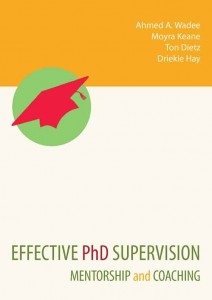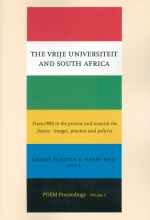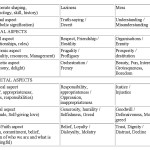Effective PhD Supervision – Chapter Seven – Bibliography and Recommended Reading
 The books, journals and related resources listed below have played an important role in the compilation of this handbook and many have proven to be invaluable in our day-to-day interactions with postgraduate students.
The books, journals and related resources listed below have played an important role in the compilation of this handbook and many have proven to be invaluable in our day-to-day interactions with postgraduate students.
Argyris, Chris; Schön, Donald A. (1974) Theory in practice: Increasing professional effectiveness. San Francisco: Jossey Bass. ISBN 0875892302, 9780875892306
‘This book is a landmark in two fields. It is a practical guide to the reform of professional education. It is also a beacon to theoretical thinking about human organizations, about their interdependence with the social structure of the professions, and about theory in practice.’ — Journal of Higher Education.
Badenhorst, Cecile. (2006) The Scribe’s Journey. New Voices Publishing, Cape Town, South Africa. ISBN-13: 978-1-920094-30-0
The Scribe’s Journey contains over 150 writing exercises. Each one is designed to take you away from the world of to-do lists, priorities and products, and into the realm of possibilities, exploration and colour. The writing activities will tap into your creative source and begin to free your mind from the restrictions and limitations which so often accompany writing tasks. Whether you write reports at work, or poetry, or family histories, this book will help you write with a fresh eye.
Effective PhD Supervision – Appendices and Acknowledgments
Sanpad and its RCI programme
Anshu Padayachee
Having examined the statistical, demographic and institutional and equity characteristics of the cohort the outputs the research findings were as follows:
-The total cohort number under investigation stands at 191.
– All in all there have been 127 Ph.D.’s confirmed.
– This means that more than 1 in 2 cohorts graduated with a Ph.D. during the period under investigation.
– This also means that in a period of seven years, 16 Ph.D.’s were produced per year.
In terms of social categories the percentages of Ph.D. graduates 21 % were African females, 20%, African males, 17% Coloured females 1% Coloured males, 8% Indian females, 2% Indian males, 19% White females and 11.5% White males.
41% of the graduates were African, 19 % were coloured, 12.5% were Indian and 30, 5 % were Whites. In terms of gender 65% were females and 35% males.
POEM: The Vrije Universiteit And South Africa: 125 Years Of Sentiments And Good Faith
 This academic year (2005), the Vrije Universiteit enjoys its 125th anniversary.[1] In 1879, a handful of orthodox reformed Dutch gentlemen founded an Association for the advancement of Christian Higher Education, and on 20 October 1880, Abraham Kuyper inaugurated the Vrije Universiteit, Academia libera reformata, by delivering his famous lecture on Sphere Sovereignty, Soevereiniteit in eigen kring.
This academic year (2005), the Vrije Universiteit enjoys its 125th anniversary.[1] In 1879, a handful of orthodox reformed Dutch gentlemen founded an Association for the advancement of Christian Higher Education, and on 20 October 1880, Abraham Kuyper inaugurated the Vrije Universiteit, Academia libera reformata, by delivering his famous lecture on Sphere Sovereignty, Soevereiniteit in eigen kring.
Kuyper was never a very modest man, and he certainly was not inclined to be modest at that moment. The credits of the university he opened, were three faculties, five professors and five students. As an accomplished rhetorician he described it as onze kleine School, met den Universiteitsnaam zelve tot blozens toe verlegen (our small school, blushing to be called a university). This was not meant as an apology, but rather to make a Hegelian turn: the real credits of the VU were written in the Synod of Dordt, its claim to nobility was the courage and moral dedication of its supporters, and its worldwide value and importance (Kuyper 1880). In the Kuyperian world panorama, his University would become the intellectual centre of the international Calvinist world – the academic power-house for all the reformed churches, nations and societies in Europe, America, and the Dutch colonies in the East. And for South Africa, of course.
October 1880: this is also the month in which Piet Cronjé, on behalf of 127 Transvaler burghers, declared to the Landdrost of Potchefstroom that they would no longer pay any taxes to the British government, as that government had illegally annexed and stolen their country (Van Oordt 1898). His language was quite akin to what Abraham Kuyper had written as a commentary on Shepstone’s annexation of the Transvaal in 1877, when he stated in his daily De Standaard: robbery is a sin to the eyes of the Lord, even by a crowned robber. Read more
POEM: ‘New’ Scientific Practice In South Africa With Special Reference To Land Reform
 ..training new generations of scientists and technologists oriented towards the solving of real problems (White Paper on Science and Technology 1996).
..training new generations of scientists and technologists oriented towards the solving of real problems (White Paper on Science and Technology 1996).
The SandT capacity of the country is running as fast as it can, but is still losing ground (National Research and Development Strategy 2000).
Introduction
(2005) The landscape of scientific practice and higher education in South Africa has changed drastically since 2 February 1990. The changes that occurred in these fields during the last decade of the 20th century were probably the most incisive in the history of science and higher education in South Africa.
When the democratically elected government came into power in 1994, science was confronted with two main challenges, namely to transform the system so that the welfare of all the inhabitants could be promoted and to make South Africa competitive in a globalising world.
The new government inherited a sound science infrastructure. It was a widely dispersed and uncoordinated system in which scientists enjoyed international recognition for transplanting hearts and for enabling the deepest exploitation of mines in the world. However, the system was mainly directed at the promotion of the welfare of the white community and was strongly focussed on military defence; the provision of energy and food; and the combating of diseases.[1]
In this transformation process, South Africa was very receptive to theories, models and schools of thought. Expertise from abroad was not provided in all instances without direct or subtle influence. There are already indications that certain models, that were applied successfully elsewhere, cannot be transferred without adaptations to the South African situation, where complex issues have to be addressed. The question that arises is whether the government implements the policy documents that were designed by intellectuals who are not part of the bureaucracy. Read more
POEM: A ‘New’ Literature
 Thank you for the invitation to speak at this important conference. I have been asked to tell you something about my own experience of teaching South African literature at Dutch universities, but also to give an indication of what South African literature departments might be expecting from the Vrije Universiteit (VU) and other Dutch universities at this point in time. This I do as someone who is South African born and bred and who taught at a South African university for 16 years. Every year I go back to South Africa at least once and I have many friends who are also colleagues in Afrikaans and Nederlands departments in South Africa. For various reasons they are suffering severe cutbacks. In the Humanities Faculties at Dutch universities a similar pinch is being felt.
Thank you for the invitation to speak at this important conference. I have been asked to tell you something about my own experience of teaching South African literature at Dutch universities, but also to give an indication of what South African literature departments might be expecting from the Vrije Universiteit (VU) and other Dutch universities at this point in time. This I do as someone who is South African born and bred and who taught at a South African university for 16 years. Every year I go back to South Africa at least once and I have many friends who are also colleagues in Afrikaans and Nederlands departments in South Africa. For various reasons they are suffering severe cutbacks. In the Humanities Faculties at Dutch universities a similar pinch is being felt.
What strategies should be developed in beleaguered times? In searching for an answer I would like to draw our attention for a minute to the rich tradition of so-called extra muros departments of Dutch all over the world: Barcelona, Budapest, Goa, Helsinki, Jakarta, Johannesburg, Jerusalem, London, Los Angeles, Münster, Oldenburg, Olomouc, Oporto, Oslo, Paris, Stellenbosch, Semarang, Strasburg, St Petersburg, Vienna – to name but a few cities where Dutch literature is taught. The differentiating terms intra muros (which refers to the universities in the ‘centre’ – the Netherlands and Belgium) and extra muros (the term refers to the universities outside the walls of the centre; on the ‘margins’) are soundly entrenched in the workings of the Society of Netherlandic Studies. The same has recently become true for the teaching of South African literature. English literature by authors such as Coetzee and Fugard has of course been part of English colonial curricula for many years and I will mainly focus on the new post-apartheid status of Afrikaans literature. It is taught intra muros at South African universities of course and since 1990 extra muros in many different countries all over the world: Poland, Hungary, the Czech Republic, the USA, Austria, Germany, Russia, Belgium and the Netherlands, to name but a few. Read more
POEM: Political Studies In South Africa. A Personal Perspective.
 2005. First, let us consider the discipline’s demography in South Africa. Over the last ten years political studies or political science has been taught in each of the country’s 21 universities. Aspects of the discipline were also taught in public administration courses at polytechnics; several of these institutions are now being amalgamated with universities. Historically, as with other areas of social science, politics as an academic community was sharply divided, socially and intellectually between the English language universities and the Afrikaans medium institutions. Within Afrikaner departments, traditionally, the discipline was influenced quite heavily by American behaviouralist and quantitative social science models and methods and researchers tended to focus their work within the confines of the formal political system (including the structures of ethnic homeland government). At the segregated black universities, departments were often led and staffed by graduates from Afrikaans institutions as well as from UNISA.
2005. First, let us consider the discipline’s demography in South Africa. Over the last ten years political studies or political science has been taught in each of the country’s 21 universities. Aspects of the discipline were also taught in public administration courses at polytechnics; several of these institutions are now being amalgamated with universities. Historically, as with other areas of social science, politics as an academic community was sharply divided, socially and intellectually between the English language universities and the Afrikaans medium institutions. Within Afrikaner departments, traditionally, the discipline was influenced quite heavily by American behaviouralist and quantitative social science models and methods and researchers tended to focus their work within the confines of the formal political system (including the structures of ethnic homeland government). At the segregated black universities, departments were often led and staffed by graduates from Afrikaans institutions as well as from UNISA.
In English speaking departments, by the 1980s, Marxist approaches had supplanted traditionally liberal ideas about politics and leading researchers concentrated their attention on popular political movements, emphasising those dimensions of their activities and ideas that corresponded most closely with expressions of class consciousness. In this context, the study of the discipline had a strong historical dimension: indeed at institutions such as Wits and Cape Town the boundaries between a ‘revisionist’ history grounded in Marxist conceptions of political economy and the discipline of politics became very blurred indeed. Today, though legacies of these differences between Afrikaans and ‘English’ institutions remain, the distinctions between Afrikaans-speakers and English language practitioners of the discipline in South African are less important, particularly since the introduction of English language courses at Afrikaans universities. Read more


